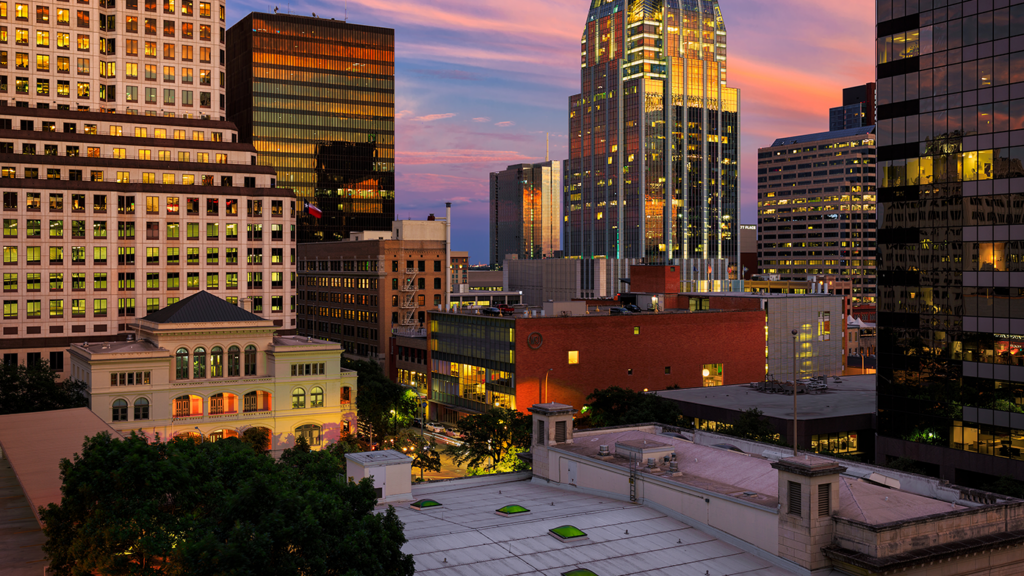Austin’s transformation into the “Silicon Hills” and 10th largest metro in the nation is a multifaceted journey, marked by a rich history and rapid tech-driven evolution. Starting back in the 1960s, when the tallest building was the State Capital, the city’s tech roots took hold led by Texas Instruments, IBM, and Dell who paved the way for future innovators, like the website Indeed which was co-founded in 2004, for decades to come. The growth of the Austin tech scene gained massive momentum in the years leading up to the pandemic with tech giants like Apple, Google, Facebook, Oracle, and Tesla relocating or expanding beyond San Francisco and establishing a large presence in Austin as major tech employers.
As a result of pre-pandemic momentum, large and robust office development visions were realized. Projects initiated pre-pandemic are now delivering to a market saturated with tech companies and their remote workforces resulting in vacancy climbing to a historic high of 22.6% at the end of 2023. Austin has a robust construction pipeline currently standing at nearly 5.1 million square feet which by the numbers makes it the fastest-growing metro relative to its size. As it currently stands, the majority of that space has yet to be leased and will be delivered vacant.
In 2023, several tech major employers reevaluated their space needs. Notably, Meta, the parent company of Facebook, put a significant amount of space in the iconic Sixth and Guadalupe skyscraper back on the market for sublease. Simultaneously, Intel shed its south campus to reduce its office footprint. With tech companies downsizing, rightsizing, and slow to return to physical offices, they still dominate the leased office inventory. Confidence in tech returning to office to the capacity it held in the near future is fading, however, several significant leases transacted in Q4 2023 signal an evolving demand.
Despite a leasing pullback, particularly in tech, job growth, and continued hiring keeps the local unemployment rate below state and national averages and the overall outlook positive.
The history of the technology industry in Austin is a story of growth, innovation, and entrepreneurial spirit. Austin is one of the most dynamic and exciting technology hubs in the world. Fueled by a robust education system, a supportive business environment, and an enviable quality of life, Austin continues to magnetize companies and is poised to lead tech innovation for years to come.
 Baily Datres
Baily Datres
Austin is one of the most dynamic and exciting technology hubs in the world. Fueled by a robust education system, a supportive business environment, and an enviable quality of life, Austin continues to magnetize companies and is poised to lead tech innovation for years to come.
Austin’s journey from a non-tech hub to a global tech powerhouse is a testament to its resilience and adaptability. Though future expansion is met with both optimism and caution as vacancy rates climb, Austin’s allure lies in its ability to embrace growth while remaining agile and resilient, enforced by its navigation of turbulence during the pandemic and the post-pandemic economic downturn. Austin’s office real estate market remains a captivating arena, offering both opportunities and challenges in the evolving landscape of tech-driven progress and rapid growth.
2024 Trends to Watch:
- Smaller leases (1,000-15,000 square feet) make up the majority of transactions and movement in 2023.
- Tech companies are increasingly starting to call employees back to the office in a hybrid capacity.
- Home to over 3,000 tech companies and a host of accelerators and incubators, Austin is quickly developing a reputation as a key player in the US AI startup scene.
- According to Built in Austin, defense technology appears to be the leading area of interest for venture capital investors on the Austin tech scene. In October and November, the two largest funding rounds went to local tech companies operating in the defense space. On the heels of defense, construction technology and logistics technology companies secured the next highest amounts of funding.
- As semiconductor, electric vehicle and other advanced manufacturing companies flock to central Texas, companies in adjacent high-tech industries are piquing interest in Austin.



 Sheena Gohil
Sheena Gohil Bob Shanahan
Bob Shanahan Dougal Jeppe
Dougal Jeppe Kai Shane
Kai Shane
 Bret Swango, CFA
Bret Swango, CFA Michelle Cleverdon
Michelle Cleverdon
 Craig Hurvitz
Craig Hurvitz